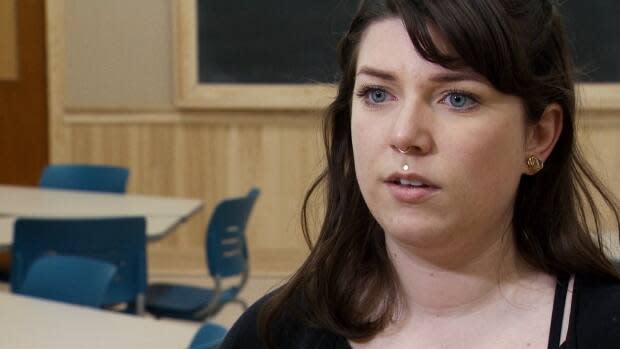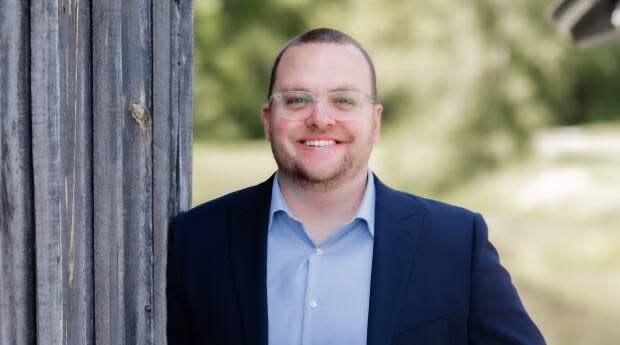Spectre of conversion therapy feared at summer camp aimed at teen boys

When Vivian Myers-Jones read the description of a summer camp being offered to teenage boys, she was instantly reminded her of her childhood and the expectation that she conform to the traditional ideals of being male.
"This was something I had very silently struggled with for 40 years of my life," said Myers-Jones, a transgender Hampton woman.
So when she heard that Caton's Island, a church-run summer camp in the St. John River near Saint John, advertised a camp described as "guiding boys to authentic manhood — from confusion to clarity," she was upset.
The language used in the ad worried Myers-Jones so much that she reported it to the RCMP with concerns it had the hallmarks of conversion therapy, which is illegal.
The RCMP were asked about the complaint, but spokesperson Cpl. Hans Ouellette said the force doesn't usually confirm whether police are investigating "unless … charges had been laid in court."
Those involved in the camp, which is also called Forged Camp, are not talking about their plans nor about a since-deleted social media post. People who have studied the controversial practice of conversion therapy say proving a crime has been committed is difficult.
'Cultural confusion regarding masculinity'
A post on Caton's Island's Facebook page, which has since been taken down, said: "We will endeavor to guide the young men at this camp out of the cultural confusion regarding masculinity to a biblical clarity by using character studies from scripture, history and modern times of real men who stood strong and made a positive difference."

The post said "authentic masculinity" is "the expected outcome."
Caton's Island's website said the camp, which is open to teenage boys between 14 and 16, will "provide a clear definition of authentic manhood and give young men a clear destination."
Phrases like "cultural confusion regarding masculinity" and "authentic masculinity" really jumped out at Myers-Jones.
The language of the ad could be taken from "the old days," she said.

"I felt I had to report it at that point," she said.
"It all looked way too familiar to me. … I suffered on account of it … I don't want to see anyone else suffer, especially the way I did."
No response from Wesleyan Church
Caton's Island is operated by the Wesleyan church, although anyone may apply to attend the camp.
CBC News called and emailed the Caton's Island camp director, and the Wesleyan Church of Canada's head office in Sussex but has not received a response.
The New Brunswick Human Rights Commission was also asked about whether Forged Camp violates human rights, but a spokesperson declined to comment because the issue is the subject of a criminal complaint.
Language matters, lawyer says
The legal standard for a criminal charge of practising conversion therapy is very high, said Fredericton lawyer and advocate Amber Chisholm, who is also a board member of Imprint Youth, which works with the LGBTQ community.
"Conversion therapy describes an intentional choice to have a queer or transgender child stop identifying that way and begin presenting as … straight or cisgender."
In the wake of the criminalization of conversion therapy, she said, the wording of any advertising "is likely going to be crafted very carefully to not transgress the Criminal Code."

And, she said, it's entirely possible that this camp was created to teach life skills which organizers see as valuable to cisgender boys and nothing more.
Chisholm does believe, however, a larger conversation is needed about gender roles.
"The issue isn't necessarily that those life skills have no value, it's that they're being tied to very rigid cisgender and hetero-normative gender roles that constrain who can and cannot participate, or how certain kinds of children who are assigned male should express themselves."
She worries this kind of language can have an effect on transgender, nonconforming or queer children that "is likely going to be negative and likely going to contribute to people staying closeted."
Groups often use 'stand-in' language
Nick Schiavo, the executive director of No Conversion Canada, said his organization is also concerned about the language used.
"It's very rare that you'll see any individual organization advertise conversion therapy, which is also captured by the federal law."
Instead, groups will use other words, like "changing behaviour to fit a traditional lifestyle or other terms that are often used as stand-ins to conceal what is actually happening."

Schiavo said it's particularly concerning "when vulnerable youths are involved. We are very concerned and it's why we're monitoring the situation."
He said he's reached out to the camp to get some more information, but he hasn't heard back from anyone.
In 2020, Caton's Island officials refused to let a transgender male stay in the same cabin as his male friends. The boy's family filed a human rights complaint that was later dismissed by the New Brunswick Human Rights Commission.


